Boarding your horse for the first time can be a scary and nerve-racking experience. While many people choose to stall board their horse, there is another option for horses that seems to prefer living exclusively in a pasture. Pasture boarding is an option at many horse boarding facilities and many horses absolutely love it!
Part of the horse world may argue that horses need to be stalled at least part of the day, but the truth is that many horses do perfectly fine living in a pasture.
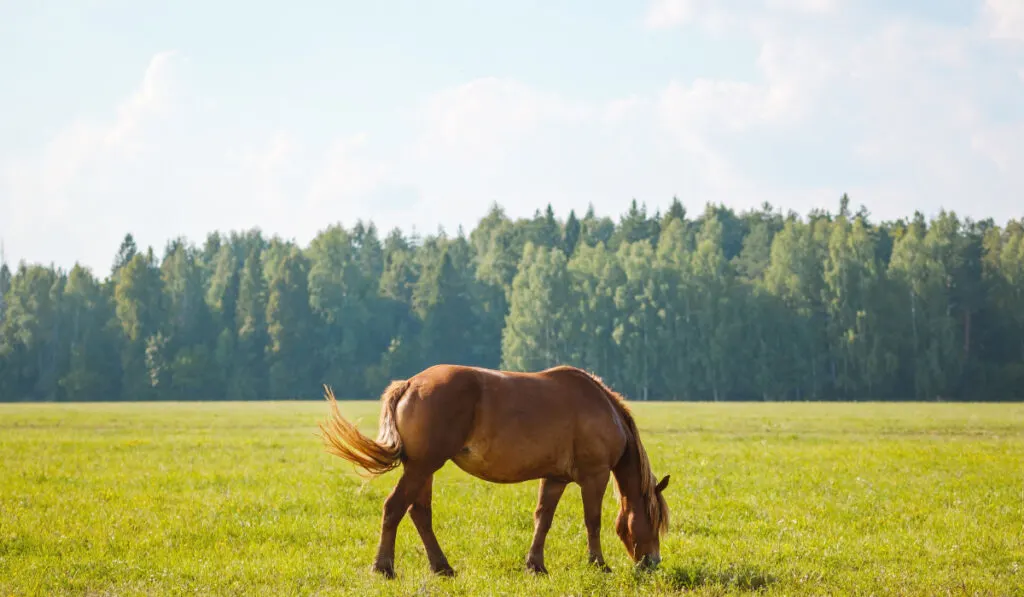
In the wild, horses thrive in open pastures and ranges, so pasture boarding is like a return to nature. Not every pasture boarding facility is the same, however, so there are some precautions and things to consider before you sign the dotted line.
Table of Contents
What is Pasture Boarding?
Pasture boarding is where a horse is kept in a pasture 24 hours a day, seven days a week. The horse is either cared for a daily basis by the facility’s staff, the owner or a combination of both.
A stall may be rarely utilized in cases of injury, illness, extreme weather or quarantine. There may or may not be other horses in the same pasture.
Different Levels of Care in Pasture Boarding
Not every facility offers 100% pasture boarding option, but if they do, the levels of care vary from farm-to-farm.
Self-Care
Some horse boarding facilities will offer an option where they simply supply the fenced pasture and shelter, while the owner provides the day-to-day feeding, watering, and general care.
This is often the cheapest option as it requires the least work from the farm’s staff. This is often referred to as a self-care or limited-care pasture boarding, but it may be called something else depending on the facility.
Full-Care
Many farms that offer pasture boarding will handle 100% percent of the daily feeding, care and management of your horse and the other horses in the pasture.
This is a more expensive option, but it allows the horse owner to visit less often since they are not required to be there each day.
Again, it may not be called full-care pasture boarding in your area, but it basically means the farm will take complete care of your pastured horse.
Private Pasture vs Group Pasture
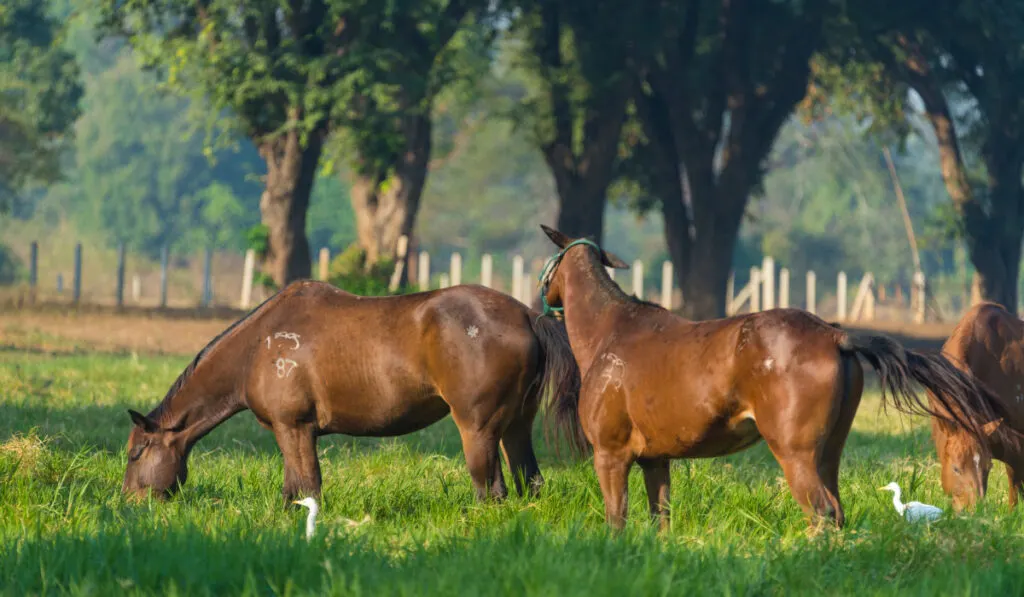
In a private pasture, your horse or horses will either be pastured alone. This means that the pasture is private and meant specifically for your horse or horses. This is often more expensive than if it was a group pasture because it limits the amount of boarding area available for other horses.
In a group pasture, horses are kept in a pasture with multiple horses owned by different boarders. This means that your horse will be in a pasture 24 hours a day with horses that it may not be familiar with at first. Group pasture boarding is cheaper than private pasture boarding because more horses can be kept in the same area.
Pros of Pasture Boarding
Pasture boarding is not the best choice for every horse, but it is a great option for some. The positives of pasture boarding simply cannot be denied.
- It lessens the chance of muscle sprains and strains by keeping horses loose and limber.
- It prevents bone loss by allows horses to sprint or run each day.
- Allows constant grazing, a natural feeding regimen that promotes digestion in horses.
- Reduces boredom and bad habits by keeping horses occupied and interactive.
- Pasture boarding is typically cheaper than full stall board.
Cons of Pasture Boarding
While there are many positives associated with pasture boarding, there are some negatives that you should know.
- Horses in a pasture may not get along which can lead to injuries.
- Some pasture boarding facilities may board too many horses in one pasture.
- It is harder to spot injuries as horses are not always looked over each day.
- Horses have less protection in bad weather.
- Weight loss can occur if nutritional needs are not monitored.
Cost of Pasture Boarding
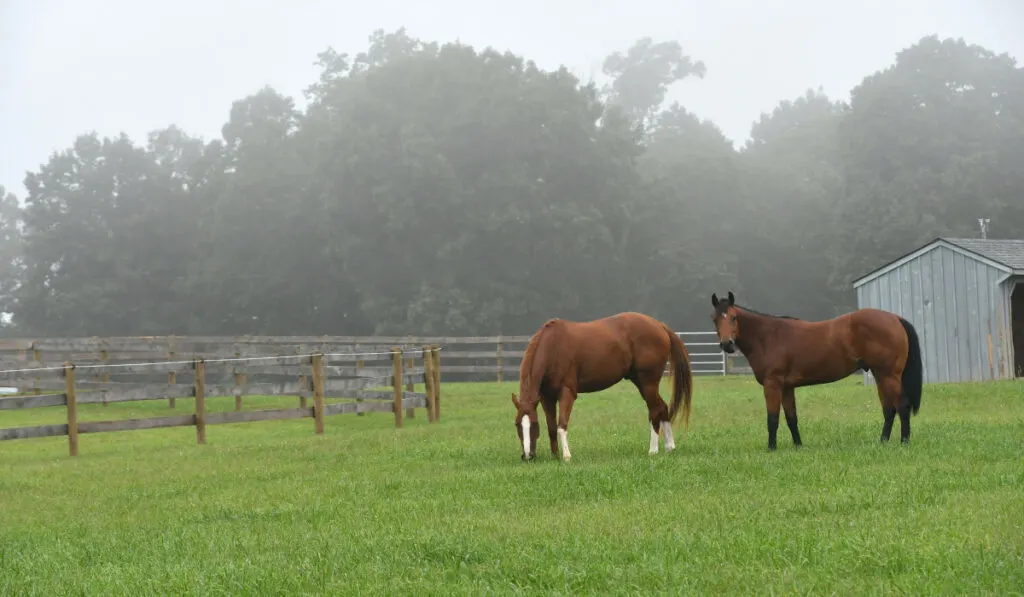
Boarding your horse in a pasture is the lowest cost boarding that can be found. It requires less upkeep for the facility, and they can board more horses in a pasture as opposed to stalls.
The cost of pasture boarding varies greatly by location, food needs, and level of care. Monthly board fees for pasture boarding can range between about $100 and $500. High scale facilities may charge more, but they may offer more amenities.
Things to Consider
There are several important things you should consider before pasture boarding your horse. You will need to find a horse boarding facility that checks of the right boxes on your list.
Age of Horse
A horse’s age should be taken into consideration when choosing a boarding facility for your horse. If you have a senior horse, you should make sure that the facility you choose specializes in senior horse or at least separates them from the younger herd.
Older horses cannot defend themselves or escape injury as easy as younger horses can.
Dominance
Horses in a pasture setting will naturally set up their own hierarchy with certain horses establishing their dominance over the rest of the herd.
While this is great for the dominant horses, it may not be as wonderful for the more submissive horses.
Sometimes dominant horses will bully other horses in the pasture, stealing food or biting them in extreme cases.
Number of Horses in a Pasture
Some horse boarding facilities will limit the number of horses per pasture while others may not. Pasture overcrowding can lead to parasite infestations, bare pastures, and overgrazing.
It is recommended that most farms have at least 1 to 2 acres per horse in each pasture depending on the quality of the grass. (source)
Water Access
Water availability is extremely important for all horse pastures, especially if there are multiple horses in the enclosed area. Be sure to check out the pasture water situation at the boarding facility you choose.
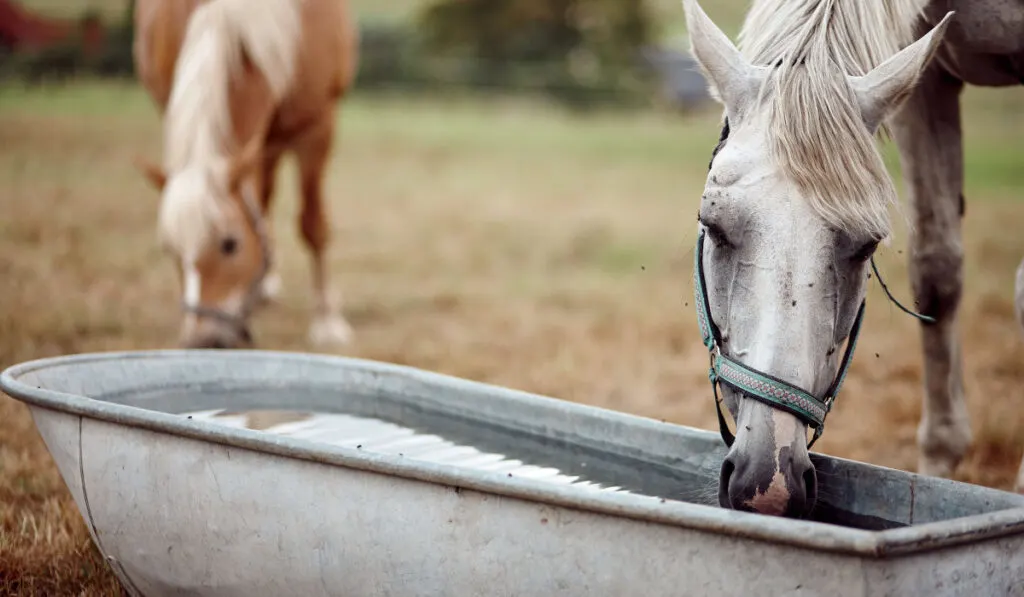
Water should be fresh, clean, easy to find and constantly replenished throughout the day.
Combined or Separated Feeding
While grass may be the main source of food during summer months, most pastured horses will need to fed hay and even grain daily during at least part of the year.
Find out how the staff feeds the hay and grain to the horses in the pasture. Some farms will feed grain to the horses separately each day while others will feed the horses altogether.
Supplemental Feeding
If you horse needs special food needs such as supplemental food, you should verify that the facility you choose is able to accommodate your needs.
This may mean that your horse will need to be fed separately from the rest of the herd and that might not be an option at every farm.
Fencing Type
The fencing at every farm can vary depending on the size and location. Farms could have wood fencing, hotwire fencing, barbwire or electric fence tape.
Barbed wire has sharp edges and can be dangerous for horses, so you may want to steer clear of pastures fenced in barbed wire.
If your horse is a known jumper, you should make sure the fence is high enough to keep your horse inside.
Shelter Availability
All horse boarding pastures should have at least on shelter available inside the pasture. Horses need a safe place to escape the heat and severe weather.
The pasture shelter should be sturdy, constantly available, and able to comfortably accommodate every horse in the pasture.
Shade Availability
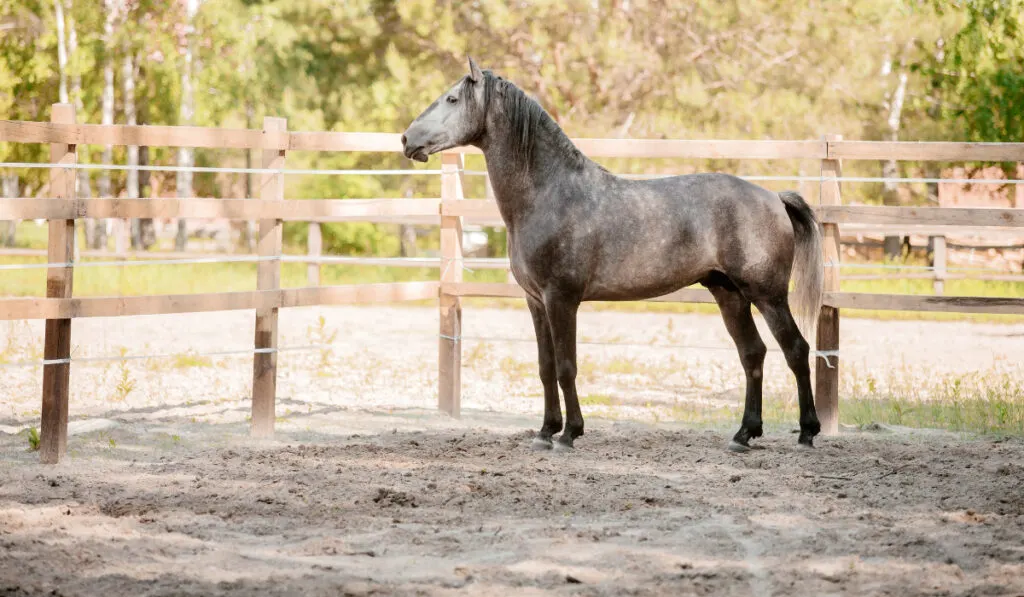
Horses should have ample shade inside of their pasture, apart from the shelter. While a good part of the pasture may have direct sunlight, it is best for it to also have some shaded areas as well.
This gives horses a cool area to hang out and escape the sun throughout the day and still have the option to graze on grass.
Blanketing Options
If you live in an area that gets cold in the winter months, you may want your horse to be blanketed overnight.
Not all pasture boarding facilities will not offer to blanket your horses for you, but some offer the option at an additional cost.
If they do not offer this option, find out if you can blanket your own horse during the winter.
Arena Availability
If the horse boarding facility has an arena on site, you should find out when and if you can use it if you are pasture boarding your horse there.
Most farms will allow arena utilization during specific hours during the day. They may or may not charge extra for arena use.
Worming Policy
Horses that are housed in a pasture together are more likely to spread parasitic infestations to one another.
It is important that the facility you choose understands this and works to keep worm infestations at a minimum.
Questions to Ask a Pasture Boarding Facility
- What vaccinations does my horse need to come to your facility?
- Is there a quarantine policy for all new horses?
- What are your payment options?
- How many horses will be in the pasture with my horse?
- How do you feed the horses in the pasture?
- Do you charge extra for winter blanketing?
- How do you prevent bullying from dominant horses?

